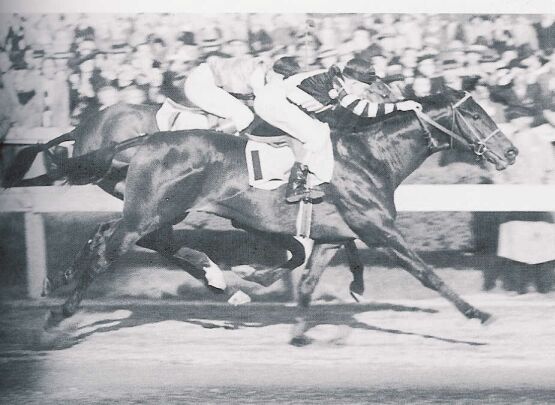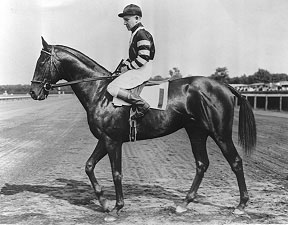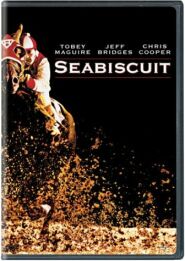

The best of Man o' War's sons began racing fifteen years after the start of the legendary chestnut's stud career. War Admiral, bred by Samuel Riddle, was foaled at the Faraway Farm in Lexington, Kentucky, in 1934. His pedigree combined the blood of Fair Play, Ben Brush, and Domino, the stallions who had founded the three most influential American lines. Sweep, the sire of War Admiral's dam Brushup, was by Ben Brush, and out of the Domino mare Pink Domino. Fair Play, of course, was the sire of Man o' War.
The royally bred little colt became known to his fans as The Mighty Atom, or simply The Admiral, and he is considered to be his great sire's finest son, although it was another of Man o' War's sons, the 1926 Belmont Stakes winner Crusader, who was most like the legendary horse in appearance. The Admiral, on the other hand, was a full hand smaller than his famous sire, standing only 15.3 hands high, and he was so darkly colored that many fans mistook him as a black horse.
War Admiral was raced by his breeder, who also had raced his sire, and was conditioned by George Conway. Exercise rider Tom Harbut, the son of Man o' War's groom Will Harbut, described War Admiral as high strung, saying he "would jump three times every time you took him out."
As a two-year-old, War Admiral showed promise, despite his hatred for the starting gate. He broke his maiden at first asking, and won once more before stepping up into stakes company. Although War Admiral failed to beat divisional leader Pompoon in the National Stallion Stakes, he still showed class by closing strongly for third money.
Next, War Admiral was paired with jockey Charley Kurtsinger for the first time in the Great American Stakes wat Aqueduct. The two held the lead into the stretch, but failed to hold off William du Pont's chestnut gelding Fairy Hill and were forced to settle for second money.
After an eleven week layoff brought about by a cough, War Admiral returned to score his first stakes victory with a five length wire to wire romp in the Eastern Shore Handicap. The Mighty Atom then ended the season with a second place finish in the Richard Johnson Stakes. He ranked eighth on the Experimental Free Handicap, which was topped by juvenile champion Pompoon.
Come spring, War Admiral scored an easy victory in a six furlong overnight at Havre de Grace. Next came the Chesapeake Stakes. The Admiral delayed the start by seven minutes before wiring the field and winning by an easy six lengths.
The Admiral became the first horse to carry Mr. Riddle's silks postward in the Kentucky Derby. After War Admiral delayed the start for eight minutes, the starter finally sent off the field of twenty. Riddle's colt easily earned his roses, leading from start to finish and cantering home a length and three-quarters ahead of his previous conqueror, two-year-old champion Pompoon. The same evening, War Admiral boarded a Baltimore bound train.
The talented Pompoon provided more of a fight at Pimlico, catching War Admiral when he bore out on the turn, and it was only after one of the most exciting stretch drives in Pimlico's history that War Admiral was victorious in his quest for the black-eyed susans.

Next it was on to Belmont Park for the mile and a half long Test of Champions. After another eight minute battle in the starting gate, disaster struck at the break. War Admiral stumbled, and sliced off about a quarter inch of his right heel. Despite the injury, The Mighty Atom led from wire to wire and tied the American record of 2:28 3/5.
The Mighty Atom was back that fall. He easily bested the field in an overnight at Laurel. Then both War Admiral and the older champion Seabiscuit were entered in the Washington Handicap at Laurel. Racing fans looked forward to the meeting with much anticipation, but Seabiscuit trained poorly and was scratched, leaving The Admiral to win as he pleased. He finished off the season with victory in the inaugural running of the Pimlico Special.
With an unbeaten season, the Triple Crown winner was named Horse of the Year, although Charles S. Howard's Seabiscuit took honors as the season's leading money winner, topping the Admiral's $166,500 by a mere $2,080.

In 1938, War Admiral continued his string of victories with the McLennon Memorial Handicap. A confident Charley Kurtsinger didn't even carry a whip. Next came an impressive score in the Widener Handicap, in which Riddle's star carried 130 pounds to second place finisher Zevson's 104 pounds. The public clamored for a meeting with Seabiscuit, the star of the west coast, and racetracks conducted an informal national bidding war as they attempted to bring the two champions together. Suggested dates stretched well into the fall, and possible locations included New York, New England, Chicago, and California. One hundred thousand dollar purses were offered, and the event was finally scheduled for Memorial Day, at the historic Belmont Park. With a winner take all purse of $100,000, the match race offered the most valuable prize in racing history.
The upcoming race dominated conversation, and everyone had a favorite. There was no doubt as to which horse Joe Palmer favored. He wrote in The Blood-Horse:
"Seabiscuit has a perfectly maddening habit of having his nose just behind Rosemont or Aneroid or Stagehand or Esposa at the finish of important races. The record further shows that War Admiral does not have this habit or anything resembling it. Seabiscuit is unquestionably a very high class horse and there have not been a dozen like him in the last twenty years, but how many years has it been since we have had a genuine stayer which did his staying from two or three lengths in front of his field? If you don't remember, Man o' War was retired after his race with Sir Barton at Kenilworth Park, October 12, 1920."
Unfortunately, Seabiscuit was withdrawn six days before the scheduled event, after leg trouble developed, and the two champions were forced to postpone the clash.
War Admiral defeated the good horse Snark in the Queen's County Handicap, giving him six pounds and winning by a length.
Fans disappointed by the postponement of the match race were dealt a second blow when War Admiral failed to go to post in the Suburban Handicap on the twenty-eighth, allegedly because he was asked to give four pounds to his former rival Pompoon. The former juvenile champion's ten race winning streak came to an end, however, when he was nosed out by Snark, who was forced to break the stakes record to claim victory.
Ironically, dodging Pompoon didn't prevent an end to War Admiral's winning streak. He went to Suffolk Downs for the Massachusetts Handicap instead of running in the Suburban, and ended up finishing out of the money for the first and only time in his career. The winner was the three-year-old Menow, the previous season's juvenile champion and the future sire of the great Tom Fool. War Minstrel, a grandson of Man o' War, was third, and then headed for Chicago where he beat Seabiscuit in the Stars and Stripes Handicap.
The reason for War Admiral's failure was a minor injury to the same right forefoot that he had damaged in the Belmont Stakes. The muddy track contributed to a misstep which resulted in the self inflicted wound.
The poor showing attracted more attention than his wins. He bounced back to winning form immediately, however. First, he proved it wasn't the mud that defeated him by galloping home eight lengths the best in a muddy Wilson Stakes. Among the defeated were such quality horses as Fighting Fox, successful full brother to Triple Crown winner Gallant Fox, and the champion mare Esposa, conqueror of both Discovery and Seabiscuit.
The Admiral beat Esposa again in the Saratoga Handicap. He had to work a bit harder for that win, giving away fourteen pounds and fighting to hold off the mare in the stretch and claim a neck victory.
Esposa didn't stop trying, running second to War Admiral twice more in the Whitney Stakes and the Saratoga Cup. New York Racing then returned to Belmont Park, where The Mighty Atom galloped to a three length win in the two mile long Jockey Club Gold Cup.
While War Admiral reeled off his series of victories at Saratoga, Seabiscuit grabbed attention in the west, scoring in the Hollywood Gold Cup.
The public continued to crave a meeting between the heroes. In the end, Pimlico Race Course became the upset winner in the fight to hold the great match when its president, Sagamore Farm's A.G. Vanderbilt, went to New York and was successful in convincing the two owners to race their horses as a "sporting venture," rather than a "financial venture," by competing in the second running of the Pimlico Special for a purse of only $15,000, in comparison to the $100,000 that Belmont Park had offered that spring. The conditions seemed to be tailor-made for War Admiral, with a walk-up start due to the Triple Crown winner's dislike for the starting gate. George Cassidy traveled from New York to start the race, since Sam Riddle had a disagreement with Pimlico's starter, the distance was confirmed at a mile and three sixteenths, since both horses had won at that distance when racing at Pimlico in the past, and each horse carried 120 pounds.
War Admiral was the betting favorite, and after two false starts the race was underway. Seabiscuit, who was usually a come-from-behind horse, changed the anticipated race strategy when he took command immediately, and although War Admiral stuck beside him into the homestretch, Seabiscuit gamely fought off War Admiral's bid for the lead and won by four lengths.
Following the Pimlico Special, War Admiral won once more before the end of the season, scoring over Mucho Gusto in the Rhode Island Handicap. Seabiscuit was named Horse of the Year.
As a five-year-old, The Admiral won his only start, a purse event in which he beat 1938 Belmont Stakes winner Pasteurized, before an injured ankle forced the end of his racing days.
Retired to stud, War Admiral stood first at Faraway Farm, and was then moved to Hamburg Place in 1958. The Admiral led the Sire's List in 1945, and was the leading sire of juvenile performers three years later. War Admiral was also an excellent broodmare sire, with his daughters including the great handicap mare Busher, who beat Calumet Farm's champion gelding Armed in the Washington Park Handicap and was named 1945 Horse of the Year, as well as Busanda, a multiple stakes winner whose victories included the 1951 Suburban Handicap and two runnings of the Saratoga Gold Cup, and whose offspring included Buckpasser, the 1966 Horse of the Year.
| Year | Starts | Wins | Seconds | Thirds | Earnings |
|---|---|---|---|---|---|
| Lifetime | 26 | 21 | 3 | 1 | $273,240 |
| Man o' War | Fair Play | Hastings | Spendthrift |
| Cinderella | |||
| Fairy Gold | Bend Or | ||
| Dame Masham | |||
| Mahubah | Rock Sand | Sainfoin | |
| Roquebrune | |||
| Merry Token | Merry Hampton | ||
| Mizpah | |||
| Brushup | Sweep | Ben Brush | Bramble |
| Roseville | |||
| Pink Domino | Domino | ||
| Belle Rose | |||
| Annette K. | Harry of Hereford | John o' Gaunt | |
| Canterbury Pilgrim | |||
| Bathing Girl | Spearmint | ||
| Summer Girl |



This text protected by all applicable copyright laws. Do not duplicate or distribute without written permission. © Spiletta42.